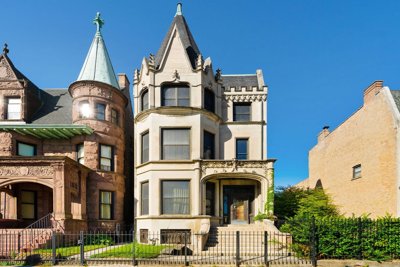Harold Washington, Chicago’s first African-American mayor, is remembered for his impactful political career and the changes he brought to the city. After he graduated from the Northwestern University College of Law, he would go on to serve in both the Illinois State Legislature and the United States Congress. Before his rise to prominence, he grew up in a modest home on the South Side of Chicago. That childhood home is now up for sale, offering a buyer the chance to preserve a part of the legacy of a man who would go on to make history.
In 1928 Washington was six years old when he, his brother Edward and father Roy moved into the house. The Bronzeville greystone at 3936 S. Martin Luther King Jr. Drive still has its original finials and crenellations on the roof. The standout tower that rises above the house gives it a bold, castle-like vibe. Unfortunately, the inside of the home is in desperate need of rehabbing. Paulette Edwards, the Coldwell Banker Realty agent who’s representing the property, said, “It's a piece of Chicago history. I would love to see somebody bring this house that he lived in back to life.”
Built in 1894 on what was formerly known as Broad Boulevard, the marble floor in the entry, all of the original ornate wood trim of the staircase and built-in cabinetry are exquisitely preserved. In the living room, there are two glass-doored bookcases on either side of one of four original fireplaces. The dining room has a breathtaking leaded glass built-in china cabinet surrounded by the original mural of trees covering the walls above the wainscoting.
The second floor has seven bedrooms. The bedroom of the future mayor, located in the tower, has a large three-windowed nook. According to “Harold, the People’s Mayor, Biography of Chicago’s First Black Mayor” by Dempsey Travis, “Young Harold spent evenings looking out of his second-floor bedroom window watching white patrons in fancy dress get out of their limousines to enter the Grand Terrace ballroom on the other side of Broad Boulevard.” These early experiences in Bronzeville helped lay the foundation for Harold Washington's future as a politician who would later fight for racial justice and work to improve the lives of all Chicagoans.
Growing up in Bronzeville, Washington was exposed to racial segregation and discrimination, which deeply influenced his later political activism. He witnessed firsthand the challenges faced by African-Americans, which helped shape his commitment to fighting for civil rights and racial equality. Despite the challenges, Washington expressed a sense of pride in his neighborhood, where he was surrounded by successful African-American professionals and community leaders. This instilled in him the belief that despite systemic obstacles, African-Americans could achieve greatness.
The sale of the home presents an opportunity to preserve a significant piece of Chicago's past while offering the potential to restore a historic property that reflects the roots of one of the city's most influential leaders.








(0) comments
Welcome to the discussion.
Log In
Keep it Clean. Please avoid obscene, vulgar, lewd, racist or sexually-oriented language.
PLEASE TURN OFF YOUR CAPS LOCK.
Don't Threaten. Threats of harming another person will not be tolerated.
Be Truthful. Don't knowingly lie about anyone or anything.
Be Nice. No racism, sexism or any sort of -ism that is degrading to another person.
Be Proactive. Use the 'Report' link on each comment to let us know of abusive posts.
Share with Us. We'd love to hear eyewitness accounts, the history behind an article.